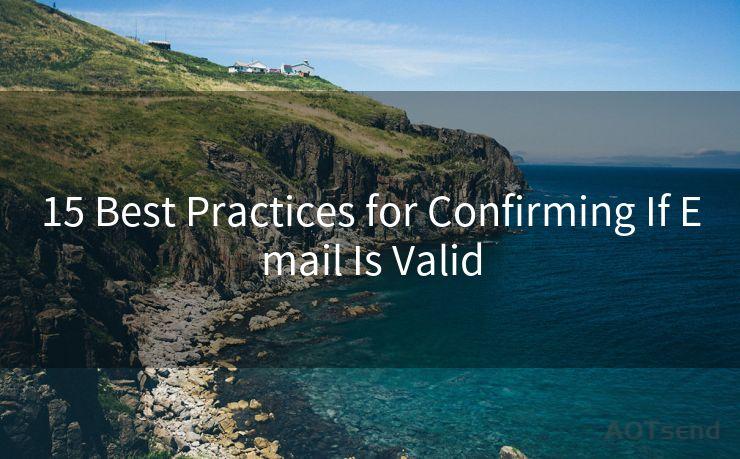15 Best Practices for Confirming If Email Is Valid




In the digital age, email communication has become an integral part of our daily lives. Whether it's for business, personal use, or marketing purposes, having a valid email address is crucial. However, with the rise of spam and fraudulent activities, it's becoming increasingly important to verify the validity of email addresses. Here are 15 best practices to confirm if an email is valid.
1. Syntax Check
The first step in verifying an email address is to check its syntax. Ensure that the address follows the standard format of "[email protected]" and that there are no typos or missing symbols.
2. Domain Validation
After syntax checking, confirm that the domain in the email address actually exists. You can use online tools or command-line utilities like nslookup or dig to verify the domain's DNS records.
3. MX Record Check
A valid email domain should have an MX (Mail Exchanger) record. Checking for this record confirms that the domain is configured to receive emails.
4. Ping the Server
Pinging the email server can help determine if it's reachable and responsive. If the server doesn't respond, it's a red flag.
5. Use of Email Verification Services
There are numerous email verification services available that can quickly and accurately validate email addresses. These services often use advanced algorithms and real-time checks to confirm email validity.

6. Double Opt-In Process
Implementing a double opt-in process for email subscriptions not only ensures that the email address provided is valid but also confirms the subscriber's intent.
7. Regular Bounce-Back Checks
Regularly monitoring bounce-back emails can help identify invalid or inactive email addresses in your database.
8. Avoiding Role-Based Addresses
Role-based addresses like "info@" or "sales@" are often generic and may not be monitored regularly. It's best to avoid these and opt for personal email addresses instead.
9. Checking for Disposable Email Addresses
Disposable email addresses are often used for spam or fraud. Use tools or services to detect and filter out these temporary email addresses.
10. Monitoring Blacklists
Regularly checking if your email domain or IP address is blacklisted can help maintain the reputation of your email communications.
11. Implementing DMARC, DKIM, and SPF
These email authentication protocols help validate the origin and integrity of emails, enhancing the trustworthiness of your email communications.
12. Keeping Up with Anti-Spam Regulations
Staying compliant with anti-spam regulations like CAN-SPAM or CASL can help ensure your emails are not marked as spam, improving deliverability.
13. Testing Email Deliverability
Regularly testing your emails' deliverability can help identify and address any issues that might affect email validity.
14. Educating Users on Email Best Practices
Educating your users or subscribers on best practices for providing and maintaining valid email addresses can help reduce invalid emails in your database.
15. Ongoing Maintenance and Updates
Continuously monitoring and updating your email validation processes to adapt to new threats and challenges is crucial for maintaining the integrity of your email communications.
By following these 15 best practices, you can significantly improve the validity and deliverability of your emails, enhancing your overall communication effectiveness. Remember, email validation is not a one-time task but a continuous process that requires regular maintenance and updates.
🔔🔔🔔
【AOTsend Email API】:AOTsend is a Managed Email Service for sending transactional emails. Support Email Types: reminders, authentication, confirmations, notifications, verification codes, invoices, password resets, account activations, billing statements, two-factor authentication (2FA), and one-time passwords (OTP) emails, etc. $0.28 per 1000 Emails. 99% Delivery, 98% Inbox Rate.
You might be interested in:
Why did we start the AOTsend project, Brand Story?
What is a Managed Email API, How it Works?
Best 25+ Email Marketing Platforms (Authority,Keywords&Traffic Comparison)
Best 24+ Email Marketing Service (Price, Pros&Cons Comparison)
Email APIs vs SMTP: How they Works, Any Difference?




Scan the QR code to access on your mobile device.
Copyright notice: This article is published by AotSend. Reproduction requires attribution.
Article Link:https://www.mailwot.com/p5526.html



